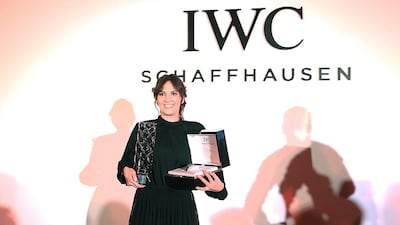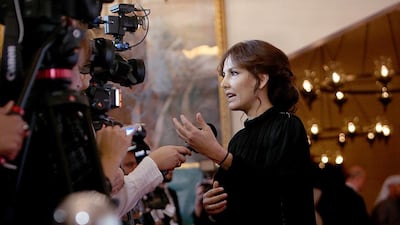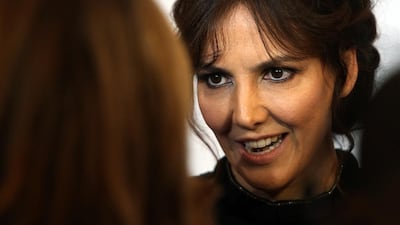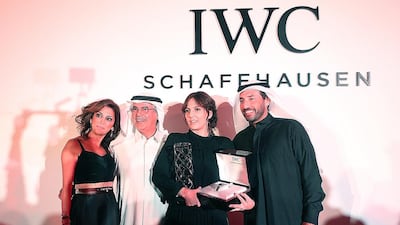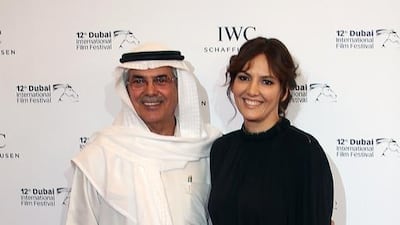DUBAI // An Emirati was named the winner of the IWC Filmmaker Award at a glittering gala dinner on Thursday night, hosted by IWC and the Dubai International Film Festival.
Layla Kaylif won the coveted award, along with US$100,000 (Dh367,000) in prize money to bring her script The Letter Writer to life on screen.
Stars including Turkish actress Tuba Buyukustun, Lebanese actress Razane Jammal, American actor Richard Dreyfuss, and British-Emirati filmmaker Ali Mostafa gathered to see Kaylif being presented with the award by the British Slumdog Millionaire actor Dev Patel.
Kaylif, 44, who lives between London and Dubai, said she was “shocked and honoured” to receive the award. She was accompanied to the event by the man who she says was the inspiration behind her script – her father, Khalifa Dasmal.
“I grew up in Dubai, and my father used to tell me tales about his childhood during the 1960s in Dubai – he was the inspiration for this story,” she said. “It’s about a young boy who is a professional letter-writer for people who are illiterate.”
Kaylif said that when writing the script, she had romanticised the stories her father had related to her.
“In my script, the boy falls in love with the object of one of his customer’s affections.”
Mr Dasmal joked about his childhood with his daughter, saying: “I thought I had forgotten that awful part of my life, and now she has rewritten it.”
It will be the first foray into films for Kaylif, who is a singer-songwriter by profession.
Kaylif was one of three entrants shortlisted for the award this year, out of 17 entrants.
Other finalists were Qatari director Khalifa Al Muraikhi for his project Sahaab and Saudi director Shahad Ameen for her feature Scales.
Jury member and Diff chairman Abdulhamid Juma was impressed that two out of three of the shortlisted scripts were written by women, and pointed out that 22 of 70 Arab directors with films screening at this year’s festival were women.
“The women are coming up with different thoughts and stories than male filmmakers, and you can see that in the scripts. Filmmaking is an emotional business – for creative people, the films are like their babies.
“Females have different insights into life and into themselves. It’s very interesting. We can learn from their experiences.”
This year's jury was presided over by Palestinian director Hany Abu-Assad, whose film The Idol will be shown at the festival. He was accompanied to the awards dinner by the film's producer, Amira Diab, who is also his wife.
Abu-Assad's 2013 film Omar was nominated for an Oscar and he won a Golden Globe for his 2006 film Paradise Now, but Abu-Assad said it was not easy to judge someone else's film script.
“I did this because I love this festival, so whatever it is they ask me to do, I answer them. But it’s very difficult to judge such a competition.
“Do you judge a script on its idea, its flow, its narrative, its drama, or its originality? How do you decide?”
Now in its fourth year of running, the IWC award – presented by IWC Schaffhausen, a watch company – was won last year by Abdullah Boushahri for his script The Water.
The Kuwaiti filmmaker, who was present at this year’s ceremony, said he was “very excited” that his film was now in pre-production and on schedule to start filming in April.
Of a total of nine films from the Gulf region that the IWC have so far awarded, six of them have been produced or are under production.
Also on Thursday, it was announced that three of the films being screened at Diff have been nominated for best motion picture in the Golden Globe nominations: Room, Spotlight and The Big Short. Room opened the festival on Wednesday and played on Thursday night.
Spotlight will be screened on Monday at 10pm and The Big Short on Wednesday at 8pm.
newsdesk@thenational.ae
